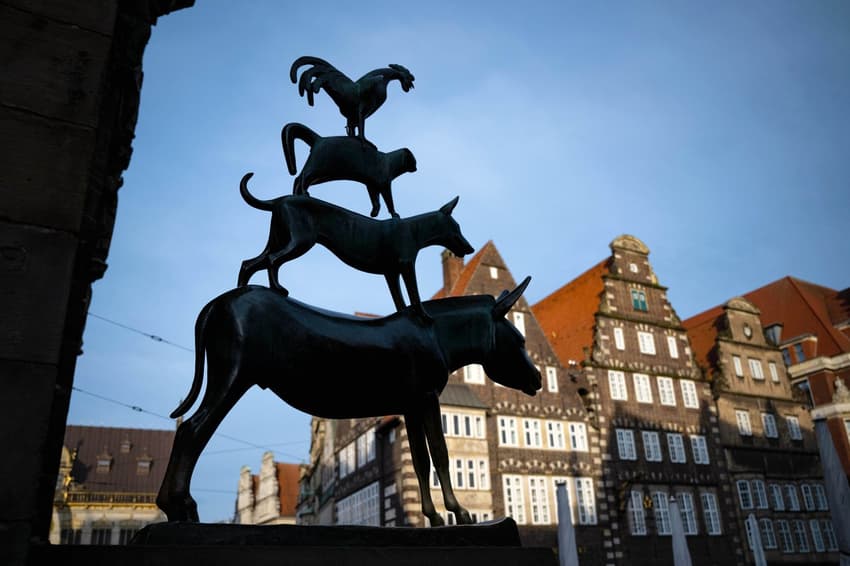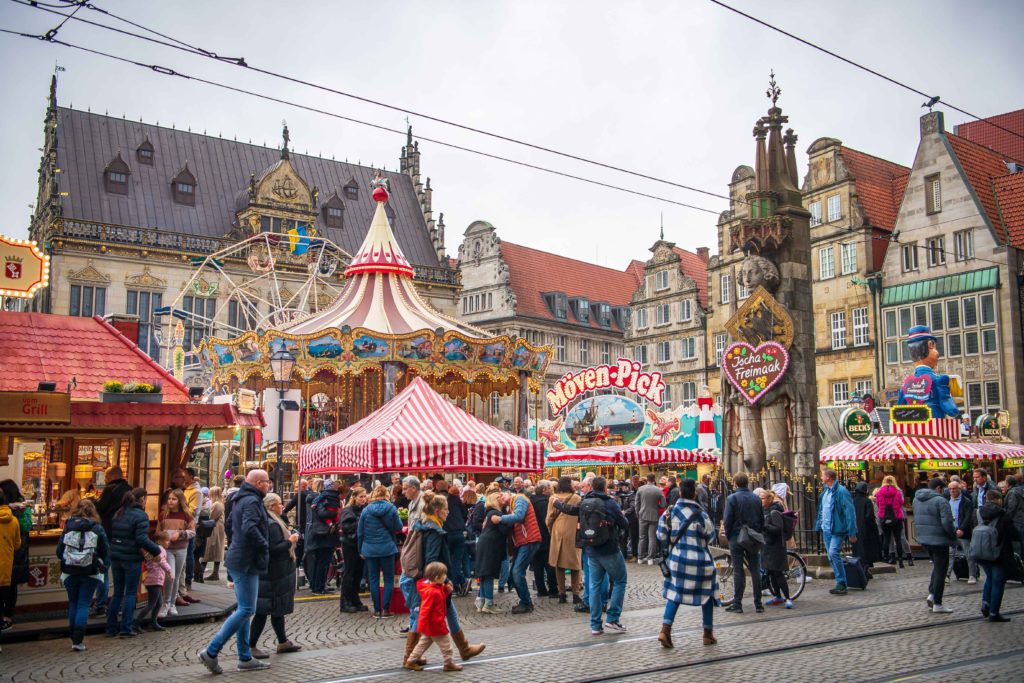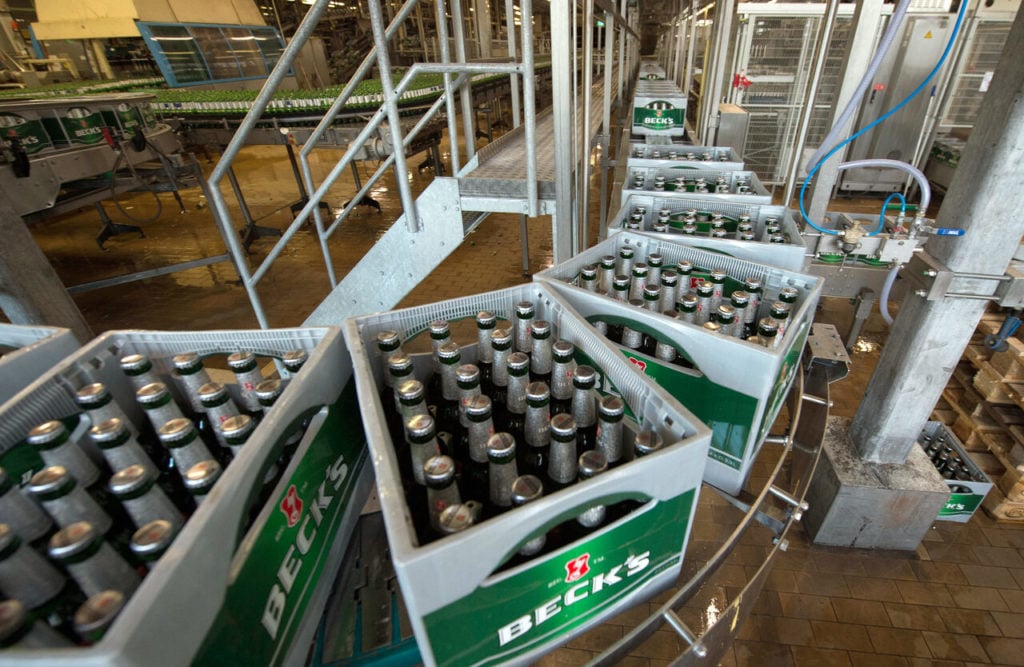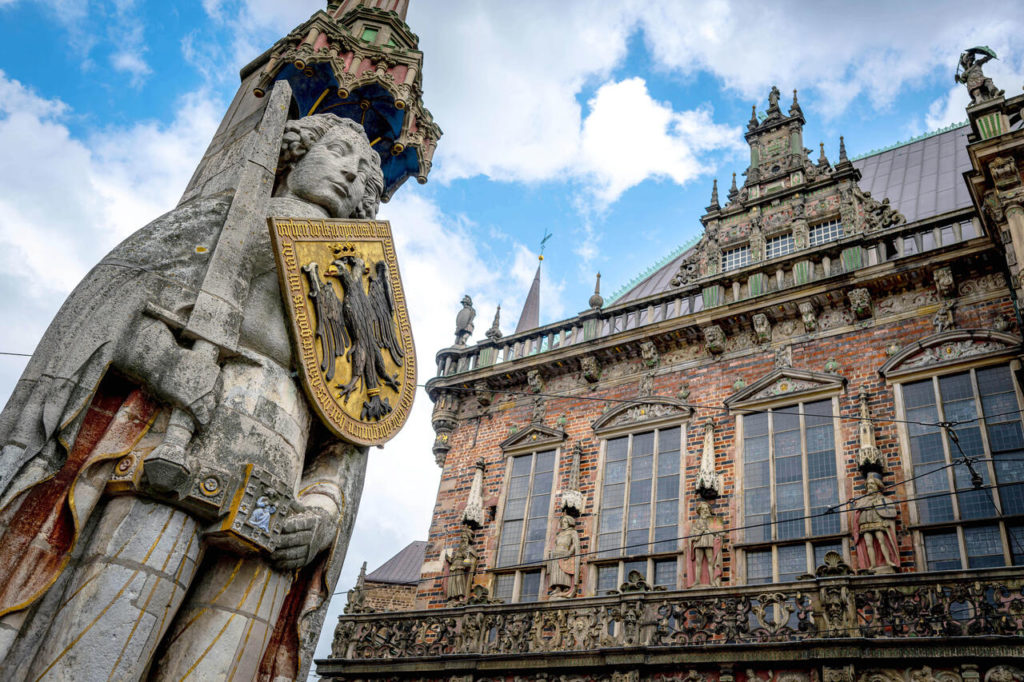10 things you never knew about the German state of Bremen

From its iconic fairy tale connections to its modern innovations, the northern city-state of Bremen has much to offer.
The city-state of Bremen, situated in the northwest of Germany, is often overshadowed by its more renowned counterparts Berlin and Hamburg. But this city has a rich history and a unique character all its own.
Here are 10 things you might not know about the city.
Home of a famous fairy tale
One of Bremen's most famous claims to fame is the Brothers Grimm fairy tale "The Town Musicians of Bremen".
The story tells of a donkey, dog, cat, and rooster who set off on an adventure to escape mistreatment on their respective farms and go to Bremen to become musicians.
Not only has Bremen erected a well-loved statue in commemoration of these fictional musicians, but it also hosts an annual "Bremen Town Musicians Festival," featuring music, food, and activities, attracting visitors from all over the world.
It’s Germany’s smallest Bundesland
Bremen is Germany's smallest state, with an area of around 419 square kilometres (that's around just under 60,000 football pitches).
READ ALSO: 10 things you never knew about the German state of Saxony
Strictly speaking, the Free Hanseatic City of Bremen is not a city-state, but a two-city state. The state of Bremen includes the cities of Bremen and Bremerhaven, a good 50 kilometres away. A total of just under 685,000 people live in the smallest federal state.
A Hanseatic Heritage
Bremen is part of the Hanseatic League, a medieval trading network that once dominated Northern Europe. This history is reflected in the city's impressive architecture, including the UNESCO-listed Town Hall and Roland statue.
Space travel starts here
Did you know that crucial parts of the International Space Station (ISS) were manufactured in Bremen? The city is a hub for the aerospace industry, with companies like Airbus contributing to space exploration.
It has a thousand-year-old festival
Dating back to 1035, the Bremen 'Freimarkt' is one of Germany's most enduring traditions. For centuries, it served as a gathering place for craftsmen from outside Bremen to showcase and sell their wares. From, the 15th century onwards, things got a bit more entertaining, and locals would come to see jugglers and exotic animals on display.

Visitors stroll around a fairground at the Bremer Freimarkt in Bremen. Photo: picture alliance/dpa | Sina Schuldt
Fast forward nearly a millennium, and this historic event still thrives. The Freimarkt continues to take place twice a year, preserving one of Germany's oldest and dearest funfair traditions. Now, the Volksfest takes great pride in hosting the largest funfair in northern Germany.
Birthplace of the three-month calendar
In 1937, the Bremen-based calendar producer Terminic (formerly B.C.Heye), was asked by a shipping company to design a calendar that offered a longer oversight than the standard one-month calendar.
And so they designed the so-called "Schifffahrtskalender" (boat trip calendar) which displayed three months at once.
The product went on to become hugely popular, particularly in workplaces, throughout the world and the company still produce around five million such calendars a year.
Hometown of one of the world's most famous beers
Every minute, around 3,000 bottles of Beck's beer are opened worldwide. But did you know that this popular brewery was founded in Bremen? The founders of Beck's were even inspired by Bremen's coat of arms when they designed the company logo in the 19th century.

Beer crates that have just been filled are transported by conveyor belt in the filling hall of the Beck's brewery. Photo: picture alliance/dpa | Carmen Jaspersen
If you visit Bremen, you can take a tour of the Beck's headquarters in Bremen to learn more about the art of brewing and the history of the brand.
It's the greenest city in Germany
No other German city has more green spaces than Bremen; there's 70 percent more green space per inhabitant here than in Berlin.
The multitude of lakeside parks, gardens and meadows have something for everyone - from cycling, swimming and outdoor sports to picnic areas and playgrounds for children. Some of the parks also host entertainment programmes, such as performances by the Bremen Shakespeare Company and the "Music and Light at Hollersee" concert.
It has a very special symbol of freedom
The Roland statue, situated in front of Bremen's historic Town Hall, stands as one of the city's most iconic landmarks. Soaring over 10 meters in height, this knightly figure on the market square is the largest free-standing statue from Germany's medieval era and holds a place on the UNESCO World Heritage list.

Bremen's Roland statue in front of the town hall. Photo: picture alliance/dpa | Sina Schuldt
Erected in 1404, the Bremen Roland portrays the valiant Roland, the legendary paladin of Charlemagne and hero of the Battle of Roncevaux Pass. It signifies civic liberty and freedom, making it a symbol of the new Europe. Protected by the Monument Protection Act since 1973, this statue showcases Roland as the guardian of the city, brandishing the legendary sword Durendal and bearing the two-headed Imperial eagle on his shield.
Legend has it that as long as Roland keeps vigil over Bremen, the city will remain free and autonomous.
Unmarried 30-year-olds have to sweep the Cathedral steps
This curious tradition, which can be traced back to around 1890, is a unique regional custom observed in Bremen for single people reaching the age of 30 in the city-state.
The origins of this tradition are rooted in a folk belief that people who didn't marry and have children during their lifetime would be subjected to extra work in the after life.
READ ALSO: Fettnäpfchen to Pechvogel: What's the story behind 'unlucky' German phrases?
As part of this tradition, the unmarried birthday boy or girl is made to wear an unflattering costume and is then accompanied by their friends, along with plenty of beer and a barrel organ for musical accompaniment, on a procession to the city's Cathedral.
Once they reach the left cathedral portal, bags of collected bottle caps are emptied onto the ground and the person whose birthday it is has to clean them up. They can only stop once they have been kissed by a virgin or, if there are none of those available - someone with the Virgo star sign.
Comments
See Also
The city-state of Bremen, situated in the northwest of Germany, is often overshadowed by its more renowned counterparts Berlin and Hamburg. But this city has a rich history and a unique character all its own.
Here are 10 things you might not know about the city.
Home of a famous fairy tale
One of Bremen's most famous claims to fame is the Brothers Grimm fairy tale "The Town Musicians of Bremen".
The story tells of a donkey, dog, cat, and rooster who set off on an adventure to escape mistreatment on their respective farms and go to Bremen to become musicians.
Not only has Bremen erected a well-loved statue in commemoration of these fictional musicians, but it also hosts an annual "Bremen Town Musicians Festival," featuring music, food, and activities, attracting visitors from all over the world.
It’s Germany’s smallest Bundesland
Bremen is Germany's smallest state, with an area of around 419 square kilometres (that's around just under 60,000 football pitches).
READ ALSO: 10 things you never knew about the German state of Saxony
Strictly speaking, the Free Hanseatic City of Bremen is not a city-state, but a two-city state. The state of Bremen includes the cities of Bremen and Bremerhaven, a good 50 kilometres away. A total of just under 685,000 people live in the smallest federal state.
A Hanseatic Heritage
Bremen is part of the Hanseatic League, a medieval trading network that once dominated Northern Europe. This history is reflected in the city's impressive architecture, including the UNESCO-listed Town Hall and Roland statue.
Space travel starts here
Did you know that crucial parts of the International Space Station (ISS) were manufactured in Bremen? The city is a hub for the aerospace industry, with companies like Airbus contributing to space exploration.
It has a thousand-year-old festival
Dating back to 1035, the Bremen 'Freimarkt' is one of Germany's most enduring traditions. For centuries, it served as a gathering place for craftsmen from outside Bremen to showcase and sell their wares. From, the 15th century onwards, things got a bit more entertaining, and locals would come to see jugglers and exotic animals on display.

Fast forward nearly a millennium, and this historic event still thrives. The Freimarkt continues to take place twice a year, preserving one of Germany's oldest and dearest funfair traditions. Now, the Volksfest takes great pride in hosting the largest funfair in northern Germany.
Birthplace of the three-month calendar
In 1937, the Bremen-based calendar producer Terminic (formerly B.C.Heye), was asked by a shipping company to design a calendar that offered a longer oversight than the standard one-month calendar.
And so they designed the so-called "Schifffahrtskalender" (boat trip calendar) which displayed three months at once.
The product went on to become hugely popular, particularly in workplaces, throughout the world and the company still produce around five million such calendars a year.
Hometown of one of the world's most famous beers
Every minute, around 3,000 bottles of Beck's beer are opened worldwide. But did you know that this popular brewery was founded in Bremen? The founders of Beck's were even inspired by Bremen's coat of arms when they designed the company logo in the 19th century.

If you visit Bremen, you can take a tour of the Beck's headquarters in Bremen to learn more about the art of brewing and the history of the brand.
It's the greenest city in Germany
No other German city has more green spaces than Bremen; there's 70 percent more green space per inhabitant here than in Berlin.
The multitude of lakeside parks, gardens and meadows have something for everyone - from cycling, swimming and outdoor sports to picnic areas and playgrounds for children. Some of the parks also host entertainment programmes, such as performances by the Bremen Shakespeare Company and the "Music and Light at Hollersee" concert.
It has a very special symbol of freedom
The Roland statue, situated in front of Bremen's historic Town Hall, stands as one of the city's most iconic landmarks. Soaring over 10 meters in height, this knightly figure on the market square is the largest free-standing statue from Germany's medieval era and holds a place on the UNESCO World Heritage list.

Erected in 1404, the Bremen Roland portrays the valiant Roland, the legendary paladin of Charlemagne and hero of the Battle of Roncevaux Pass. It signifies civic liberty and freedom, making it a symbol of the new Europe. Protected by the Monument Protection Act since 1973, this statue showcases Roland as the guardian of the city, brandishing the legendary sword Durendal and bearing the two-headed Imperial eagle on his shield.
Legend has it that as long as Roland keeps vigil over Bremen, the city will remain free and autonomous.
Unmarried 30-year-olds have to sweep the Cathedral steps
This curious tradition, which can be traced back to around 1890, is a unique regional custom observed in Bremen for single people reaching the age of 30 in the city-state.
The origins of this tradition are rooted in a folk belief that people who didn't marry and have children during their lifetime would be subjected to extra work in the after life.
READ ALSO: Fettnäpfchen to Pechvogel: What's the story behind 'unlucky' German phrases?
As part of this tradition, the unmarried birthday boy or girl is made to wear an unflattering costume and is then accompanied by their friends, along with plenty of beer and a barrel organ for musical accompaniment, on a procession to the city's Cathedral.
Once they reach the left cathedral portal, bags of collected bottle caps are emptied onto the ground and the person whose birthday it is has to clean them up. They can only stop once they have been kissed by a virgin or, if there are none of those available - someone with the Virgo star sign.
Join the conversation in our comments section below. Share your own views and experience and if you have a question or suggestion for our journalists then email us at [email protected].
Please keep comments civil, constructive and on topic – and make sure to read our terms of use before getting involved.
Please log in here to leave a comment.